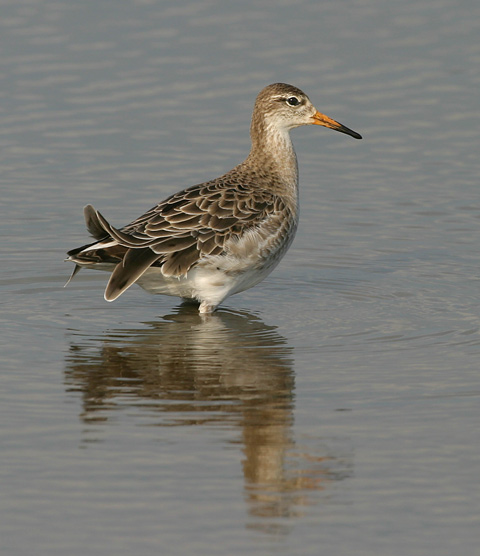(Picture of male developing winter plumage. C/right) |
(References updated) |
||
| Line 47: | Line 47: | ||
</gallery> | </gallery> | ||
==References== | ==References== | ||
| − | #{{Ref- | + | #{{Ref-Clements6thAug18}}#Handbook of the Birds of the World Alive (retrieved March 2016) |
#Wikipedia | #Wikipedia | ||
#Birdwatchers Pocket Guide ISBN 1-85732-804-3 | #Birdwatchers Pocket Guide ISBN 1-85732-804-3 | ||
Revision as of 00:40, 18 September 2018
- Calidris pugnax
Philomachus pugnax
Identification
26–32 cm (10¼-12½ in)
Variable plumaged wader; male much larger than female. Small head on long neck. Legs can be green, yellow, orange or flesh-coloured.
Breeding Male
Has extra-ordinary ear tufts, crest and erectile ruff - black, brown, white; barred or streaked. Belly and sides of rump are white. Black breast. Pale narrow wing bar. Bill may be brown, red or yellow.
Female, Juvenile and winter Male: brown, streaked darker above with a buffy breast.
Their feathers seem to 'ruffle' more easily in the wind than happens with other waders.
Similar Species
Winter males similar to Common Redshank but look round-shouldered and pot-bellied in comparison.
Distribution
Breeds in the Arctic and sub Arctic regions of Northern Europe and Asia.
On migration can be found anywhere along the coast of Western Europe and at inland wetland sites.
Large numbers winter in East, South and West Africa, although birds may be found in India and further East. They will travel large distances on migration, birds from Eastern Siberia have been found in West Africa
Rare vagrant to California, New York, New Jersey, and Massachusetts. Accidental vagrant to Kansas.
Taxonomy
This is a monotypic species[1]. Formerly placed in the genus Philomachus.
Habitat
Breeds in bogs, marshes and wet meadows. Winter, and on passage, can be found on inland marshes, lake shores, occasionally estuaries.
Behaviour
Breeding
They build their nest in a well-hidden location on the ground, and 3-4 eggs are laid.
Diet
They forage in wet grassland and soft mud. The diet includes insects, earthworms, larvae, frogs, small fish, and seeds.
Vocalisation
A low "chut-ut".
<flashmp3>Philomachus pugnax (song).mp3</flashmp3>
Listen in an external program
Gallery
Click on photo for larger image
Photo © by frydferd
Martin Mere February 2008Breeding Male
Photo © by Robert L Jarvis
North Finland June 2001Intermediate Plumage
Photo © by trevor.wht
Abberton Reservoir, Near Colchester, Essex, England, July 2009Large Group in Winter
Photo © by Alok Tewari
Gurgaon, India, Nov 2010.
References
- Clements, J. F., T. S. Schulenberg, M. J. Iliff, D. Roberson, T. A. Fredericks, B. L. Sullivan, and C. L. Wood. 2018. The eBird/Clements checklist of birds of the world: v2018. Downloaded from http://www.birds.cornell.edu/clementschecklist/download/
- Handbook of the Birds of the World Alive (retrieved March 2016)
- Wikipedia
- Birdwatchers Pocket Guide ISBN 1-85732-804-3
- Collins Pocket Guide to British Birds 1966
- Collins Field Guide 5th Edition
- Birds of the Western Palearctic interactive 2.0.3 2009
Recommended Citation
- BirdForum Opus contributors. (2024) Ruff. In: BirdForum, the forum for wild birds and birding. Retrieved 22 December 2024 from https://www.birdforum.net/opus/Ruff
External Links











